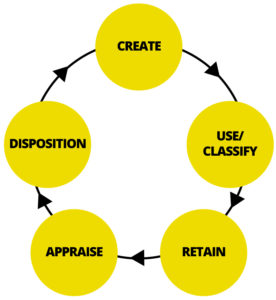Records Management
What is Records Management?
Management of records can be thought of in terms of a Records Lifecycle.

Diagram of Records Life Cycle: Image showing Records Lifecycle of Create > Use/Classify > Retain > Appraise > Disposition.
The Records management team are here to provide advice and expertise on each stage of the lifecycle, including how to maintain and preserve University records and ensure appropriate retention of records in line with the University Classification and Retention Schedule, and guide you as to what to do when the records are no longer in active use.
Our commitment to records management
The University Records Manager is responsible for the governance, safeguarding and delivery of information held by the organisation, whether that is physical or electronic records.
Alongside the Records Manager, the University employs a Records Management Officer and a Records Management Administrator to support and assist with records management activities, information compliance tasks and the University Archive.
The team work together to manage records in line with industry standards set out in ISO 15489.
Data Owners are senior stakeholders within the University who are accountable for the quality of data managed in their faculty/department. The Records Management team can work to support them in maintaining high standards of recorded information.
Electronic Document and Records Management System (EDRMS)
The University uses SharePoint as our EDRMS to help manage the digital data that we hold. This system employs RecordPoint as a layer of intelligence enabling it to identify when the records have come to the end of their retention period and prompt their appraisal and disposal as appropriate. This processing means that we are not keeping things longer than we are legally able to, and stops the University storing what is essentially rubbish within its systems.
Records Retention and classification
Whether the Records we hold are in a physical form or a digital one, there are prescribed limits to the amount of time those records should be maintained. These are the periods of time, varying from a few months to permanency, during which a record must be maintained by the University. This is usually determined by statute, legal, regulatory or business compliance, or where these do not apply, by a best assessment of risks involved in destruction against the costs of retention. This has been set out in the University Classification and Retention Schedule.
Data held in our EDRMS will be classified and a retention applied automatically. On expiry of any retention, Records are reviewed and actioned by the Records Management team in conjunction with the data owners. For physical records this process is a manual one and it is the responsibility of data owners and their teams to ensure that they are maintaining their records for the correct amount of time. See procedures below.